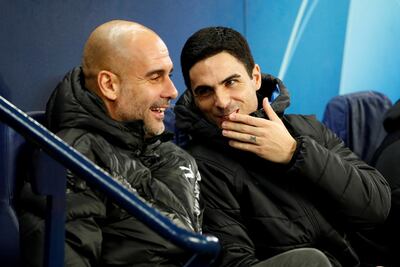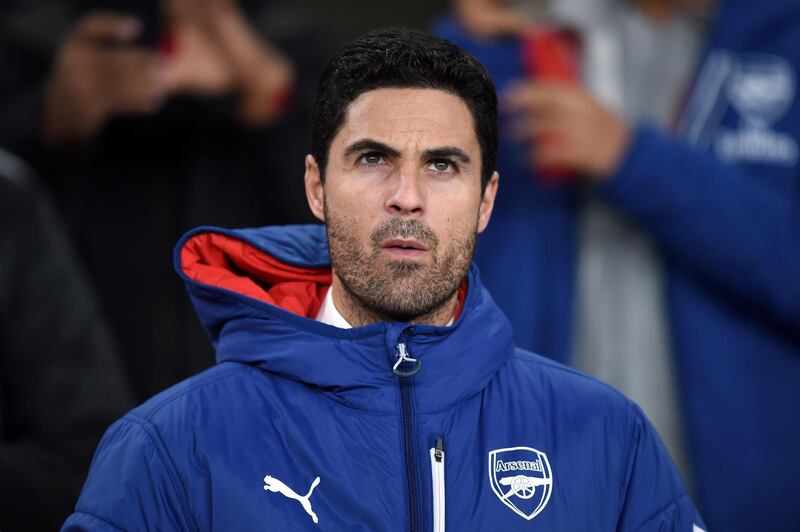The first time Mikel Arteta joined Arsenal he took a pay cut to go. It was 2011 when Arteta left Everton to sign for an Arsenal side who, having just lost 8-2 to Manchester United, were at a low ebb. With Arteta offering direction and leadership, they recovered to salvage a top-four finish.
If Arsenal’s hopes that history could repeat itself may be far-fetched, they can at least savour the sense their probable next manager saw something sufficiently special in North London to leave a club where he was happy and popular.
After Barcelona, where he joined at 14 but soon realised the presence of Pep Guardiola and Xavi blocked his path to the first team, his dream was to play for Arsenal. Not, presumably, the current shambolic Arsenal. But Arteta, an admirer of Arsene Wenger’s greatest teams, knows what the club was and what it could be.
The impending appointment of a rookie is a risk for Arsenal. Having lost their place in the top four, they could be cast out of the 'big six'. The hazardous element of plumping for a beginner persuaded Arsenal to choose Unai Emery ahead of Arteta 18 months ago, but the supposedly safe option proved unsafe.
Instead, Arsenal find themselves overlooking the far greater experience of Carlo Ancelotti for the best qualified novice in the business. Team-mates used to tell Arteta he would become a manager. Their prophecy seems set to come true this week.
Arteta’s footballing family tree is distinguished. Mauricio Pochettino is “like a big brother” from their days at Paris Saint-Germain. He played for Wenger and David Moyes, two of this millennium’s three longest-serving managers.

Then there is Guardiola. Their paths diverged for a decade and a half but they stayed in contact until, four years ago, the then Bayern Munich manager cornered Arsenal’s injured captain after a Champions League tie. “He told me he wanted to work with me if he ever moved to England,” Arteta said in Pol Ballus and Lu Martin’s book Pep’s City. “So when I retired and called him and said: ‘Is that job still available?’”
It was, but the notable element is how much trust Guardiola put in Arteta. He was not hired merely for his local knowledge. He put Arteta in charge against Arsenal in 2016, when the younger man’s mid-match change of formation, to use Kevin de Bruyne as a false nine, was instrumental in securing a 2-1 win.
Arteta’s first actual match at the helm went rather less well: with Guardiola banned from the touchline, he took the reins for last season’s Champions League tie with Lyon. City lost 2-1. Arteta was publicly and privately critical of his players.
He and Guardiola think similarly. “We share the same mentality and philosophy,” he said last year and Aymeric Laporte noted how well they dovetailed.
“They are very complementary to one another,” said the defender. But it was a meeting of minds. The ideas Arteta underlined at 2014, when still in the Arsenal midfield, could have come from Guardiola.
“My philosophy will be clear,” he told their club website and, given the lack of clarity amid Emery’s communication problems, Arsenal may welcome that.
“I will have everyone 120 per cent committed, that’s the first thing. If not, you don’t play for me. I want the football to be expressive, entertaining. I cannot have a concept of football where everything is based on the opposition. We have to dictate the game and we have to entertain people.”
Those levels of commitment are instructive, too: Arsenal are one of the worst sides out of possession in the Premier League. It points to an injection of intensity, and the issue if Arsenal’s under-performing senior players will listen to an untried manager.
But if laxness has been an issue at the Emirates for years, Arsenal may be getting a perfectionist. Arteta has the attention to detail of a man who walked into a building, noticed a shelf that was fractionally askew and wanted it fixed. At Arsenal, where the lack of balance is altogether more apparent, it is a question if a coach with the ideal apprenticeship can prove a master manager.







